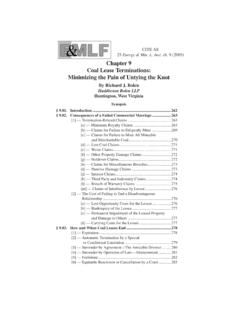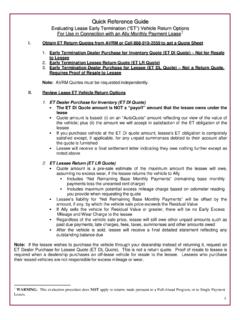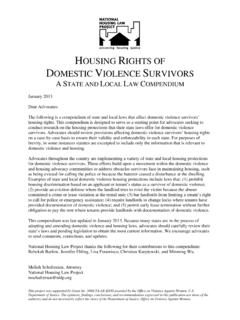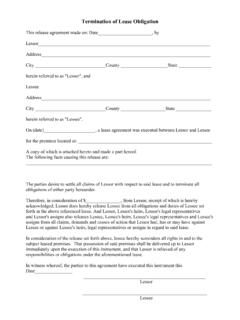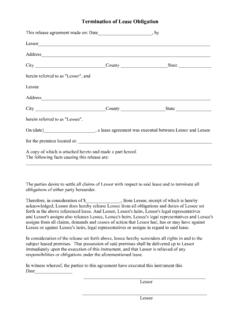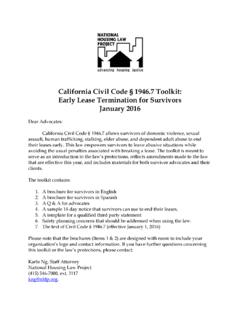Transcription of Barry R. Katz and Robert J. Taylor, Arnstein & Lehr LLP
1 This Article is published by Practical Law Company on its PLCLaw Department web service at commercial real estate Leases: IllinoisBarry R. Katz and Robert J. Taylor, Arnstein & Lehr LLPC opyright 2013 Practical Law Publishing Limited and Practical Law Company, Inc. All Rights TERM AND RENEWALSIf the expiration date of a lease falls on a Sunday or holiday, in the absence of any express language in the lease to the contrary, that date must be considered the last day of the lease . Failure to deliver the premises on the stated expiration date could result in the landlord declaring the lease to be a holdover lease , pursuant to the holdover provisions of the lease . In the absence of a holdover provision in the lease , possession after the expiration date of the lease would still be a holdover-tenancy at sufferance under Illinois common safer course of action would be for a tenant to clarify the delivery date with the landlord, and if not able to do so, then to deliver the premises on the stated date.
2 Generally, options to renew a lease do not create a new lease . Instead, a renewal prolongs the original lease agreement for the extended period on the terms and conditions of the original lease . lease terms such as termination options and additional renewal options continue into the extended term unless the lease expressly provides otherwise. A Q&A guide to state laws and customs on managing commercial real estate leases in Illinois. LETTERS OF INTENTBINDING LETTERS OF INTENTIn the absence of an express statement that the letter of intent is binding, Illinois courts will consider case-specific evidence to determine the intent of the parties to be bound, including: The level of detail in the letter of intent. The amount of money involved.
3 (Interway, Inc. v. Alagna, 407 615 (Ill. App. Ct. 1980).)IMPLIED DUTY TO ACT IN GOOD FAITHI llinois Courts have held that a duty to negotiate in good faith exists even if the letter of intent is not binding. Good practice suggests a provision in every letter of intent that the letter of intent is not binding until execution by both parties of a mutually acceptable lease . 1. How is the binding nature of a letter of intent determined in your jurisdiction? Is there an implied duty of good faith even if the letter of intent is non-binding?2. If the lease term expires on a Sunday, can the tenant surrender the premises on the next business day or is there a risk that the landlord will claim a default?3. If a tenant extends its term, are the tenant s options, such as a termination or renewal option, automatically included in the extension term?
4 Q&A TitleCopyright 2013 Practical Law Publishing Limited and Practical Law Company, Inc. All Rights OF RENTT here is no Illinois statute that expressly grants a tenant the right to withhold rent in the event a landlord breaches a covenant. Illinois courts have not recognized withholding of rent as a means to resolving leases include a provision that the payment of rent is independent of every other covenant in the lease . This means that while the landlord may be in default of its covenants under the lease , the tenant s covenant to pay rent is an independent covenant and not a covenant that is contingent on the landlord s performance. Most landlord form leases will include a provision that the tenant waives its right to assert a counterclaim in a non-payment tenant may not withhold or refuse to pay rent in the event of a landlord default unless there is a specific provision in a lease stating THAT HAVE INADEQUATE CONDITIONS OR ARE UNTENANTABLEIf conditions render the premises untenantable and unfit for occupancy, a commercial tenant may claim constructive eviction, which allows the tenant to surrender possession of its premises and be relieved of its obligation to pay rent under the lease (see Question 10).
5 A tenant can abate its rent if the tenant can successfully prove constructive eviction by the acts or omissions of the SUBSTANCESThe tenant s ability to abate rent will be decided on the nature of the hazardous substance. The tenant may most likely abate its rent entirely if it can prove constructive eviction due to the presence of hazardous substances that render the premises untenantable and unfit for occupancy. However, there would be no abatement if the tenant introduced or brought the hazardous material to the WINDOWSG enerally a tenant may not abate its rent for blocked windows. Most commercial leases expressly permit the landlord to block the premises windows (for example, by placement of scaffolding) in connection with repairs or compliance with local laws.
6 Good practice would be for a tenant to negotiate for no blockage of windows which would impact use and guarantor of a lease in Illinois may be discharged by an amendment of the lease which imposes a greater liability on the guarantor (Roels v. Drew Indus., Inc., 608 411 (Ill. App. Ct. 1992)).The guarantor s release hinges on whether the landlord accepts an assignment of a guaranteed lease as a termination of the lease , so that a new lease is entered into between the landlord and the the landlord accepts the assignment and a new landlord/tenant relationship is created with the assignee, the assignor is discharged and the guarantor is also discharged. No express release is required under these , if the assignment is not accepted by the landlord as terminating the lease , and the assignor remains liable for the rent, the guarantor also remains liable under the PREMISESThe measurement of commercial space is dependent on the local customs used within each county in local jurisdictions follow the Building Owners and Managers Association (BOMA) standards for measuring space.
7 However, BOMA is not always used, so the tenant should determine the measuring method of the landlord during lease negotiations to ascertain that the tenant s square footage referenced in the lease is correctly If the guaranty does not expressly require a guarantor s consent to a lease amendment, can a guarantor still be held liable for the lease as amended?4. Can the tenant withhold its rent if the landlord breaches a covenant under the lease ?5. Can the tenant abate its rent if: There is no (or inadequate) heat or air-conditioning in the premises or the premises are otherwise untenantable? There is a hazardous substance, such as asbestos or mold in the premises? The windows are completely or partially blocked?
8 7. If the lease is assigned, is the guarantor automatically released from the obligations under the lease or is an express release required?8. Is there a standard procedure for measuring the tenant s premises and the building?3 Copyright 2013 Practical Law Publishing Limited and Practical Law Company, Inc. All Rights in accordance with the terms of the lease (Dell Armi Builders, Inc v. Johnston, 526 409, 411 (Ill. App. Court. 1988)). If the failure of the landlord to make repairs interferes with the tenant s use and occupancy of the premises so that it cannot conduct its business, the tenant can vacate the , to claim constructive eviction, the tenant must first give the landlord a reasonable opportunity to cure the breach, and if the breach is not cured, the tenant must vacate the premises within a reasonable period of OF THE TENANT FOR COSTS OF REPAIRIn the absence of a specific provision in a lease , a tenant does not have the right to seek reimbursement for RIGHTThe tenant s right to terminate the lease is dependent on the language in the lease and specific facts of the.
9 In the rare instance when the lease is silent regarding the tenant s rights in the event of a casualty or damage to the leased property, the tenant may have the right to terminate its lease if the tenant can prove the premises are untenantable as a result of the casualty or damage (see Question 10).RENT ABATEMENT RIGHTN early all commercial leases address the right of the landlord and tenant in the event of fire or other casualty. For example, nearly all leases address the length of time a landlord is granted to repair the premises after a casualty. Most leases will grant the tenant abatement of rent for the time the premises are not available for tenant s use and occupancy. In the absence of specific language, pursuant to the doctrine of constructive eviction the tenant may be able to obtain an abatement of its rent in proportion to the portion of the premises that is untenantable (see Question 5).
10 LANDLORD S RESTORATIONMost commercial leases contain a provision regarding each party s responsibilities or liabilities if a casualty loss that causes damage to premises occurs. When a lease fails to assign responsibility for damage or destruction, common law principles will Illinois common law, neither the landlord nor the tenant has an obligation to restore the premises in the event of destruction by fire, absent an agreement to the contrary between the parties. However, the tenant remains liable for the rent. (Lewis v. real estate Corp., 127 272, 276 (Ill App Ct. 1955).)In Chicago, landlords commonly use BOMA measuring standards. However, use of BOMA in Chicago is not statutory and its use would be determined by the language of the specific ACCESS WITHOUT CONSENTC ommon law in Illinois does not guaranty the right of landlord to enter the premises.
